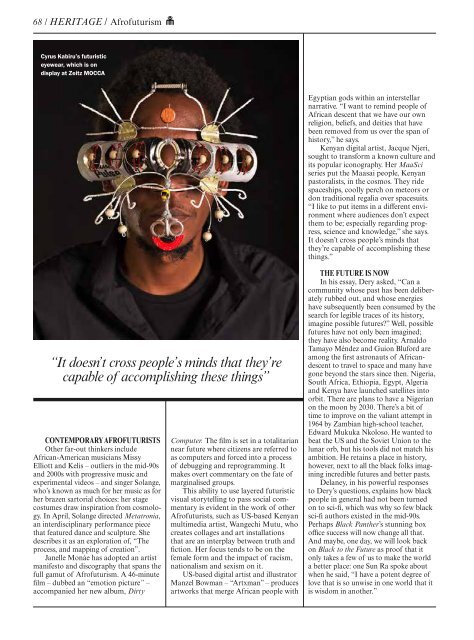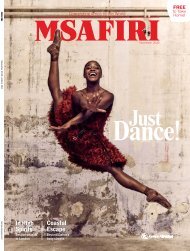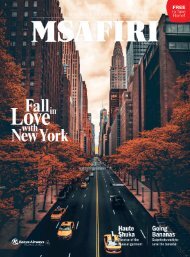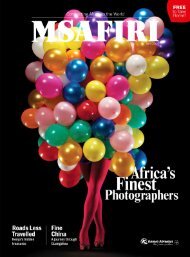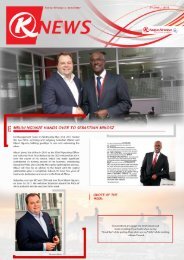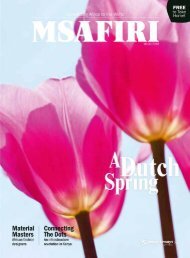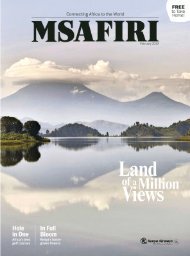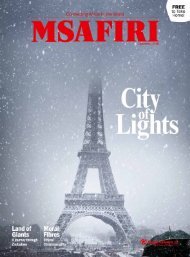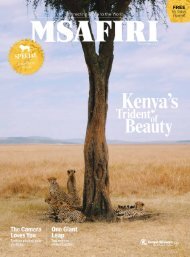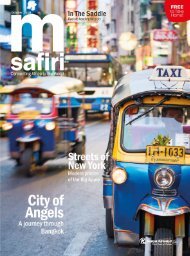Create successful ePaper yourself
Turn your PDF publications into a flip-book with our unique Google optimized e-Paper software.
68 / HERITAGE / Afrofuturism<br />
HERITAGE / 69<br />
Cyrus Kabiru’s futuristic<br />
eyewear, which is on<br />
display at Zeitz MOCCA<br />
“It doesn’t cross people’s minds that they’re<br />
capable of accomplishing these things”<br />
CONTEMPORARY AFROFUTURISTS<br />
Other far-out thinkers include<br />
African-American musicians Missy<br />
Elliott and Kelis – outliers in the mid-90s<br />
and 2000s with progressive music and<br />
experimental videos – and singer Solange,<br />
who’s known as much for her music as for<br />
her brazen sartorial choices: her stage<br />
costumes draw inspiration from cosmology.<br />
In April, Solange directed Metatronia,<br />
an interdisciplinary performance piece<br />
that featured dance and sculpture. She<br />
describes it as an exploration of, “The<br />
process, and mapping of creation”.<br />
Janelle Monáe has adopted an artist<br />
manifesto and discography that spans the<br />
full gamut of Afrofuturism. A 46-minute<br />
film – dubbed an “emotion picture” –<br />
accompanied her new album, Dirty<br />
Computer. The film is set in a totalitarian<br />
near future where citizens are referred to<br />
as computers and forced into a process<br />
of debugging and reprogramming. It<br />
makes overt commentary on the fate of<br />
marginalised groups.<br />
This ability to use layered futuristic<br />
visual storytelling to pass social commentary<br />
is evident in the work of other<br />
Afrofuturists, such as US-based Kenyan<br />
multimedia artist, Wangechi Mutu, who<br />
creates collages and art installations<br />
that are an interplay between truth and<br />
fiction. Her focus tends to be on the<br />
female form and the impact of racism,<br />
nationalism and sexism on it.<br />
US-based digital artist and illustrator<br />
Manzel Bowman – “Artxman” – produces<br />
artworks that merge African people with<br />
Egyptian gods within an interstellar<br />
narrative. “I want to remind people of<br />
African descent that we have our own<br />
religion, beliefs, and deities that have<br />
been removed from us over the span of<br />
history,” he says.<br />
Kenyan digital artist, Jacque Njeri,<br />
sought to transform a known culture and<br />
its popular iconography. Her MaaSci<br />
series put the Maasai people, Kenyan<br />
pastoralists, in the cosmos. They ride<br />
spaceships, coolly perch on meteors or<br />
don traditional regalia over spacesuits.<br />
“I like to put items in a different environment<br />
where audiences don’t expect<br />
them to be; especially regarding progress,<br />
science and knowledge,” she says.<br />
It doesn’t cross people’s minds that<br />
they’re capable of accomplishing these<br />
things.”<br />
THE FUTURE IS NOW<br />
In his essay, Dery asked, “Can a<br />
community whose past has been deliberately<br />
rubbed out, and whose energies<br />
have subsequently been consumed by the<br />
search for legible traces of its history,<br />
imagine possible futures?” Well, possible<br />
futures have not only been imagined;<br />
they have also become reality. Arnaldo<br />
Tamayo Méndez and Guion Bluford are<br />
among the first astronauts of Africandescent<br />
to travel to space and many have<br />
gone beyond the stars since then. Nigeria,<br />
South Africa, Ethiopia, Egypt, Algeria<br />
and Kenya have launched satellites into<br />
orbit. There are plans to have a Nigerian<br />
on the moon by 2030. There’s a bit of<br />
time to improve on the valiant attempt in<br />
1964 by Zambian high-school teacher,<br />
Edward Mukuka Nkoloso. He wanted to<br />
beat the US and the Soviet Union to the<br />
lunar orb, but his tools did not match his<br />
ambition. He retains a place in history,<br />
however, next to all the black folks imagining<br />
incredible futures and better pasts.<br />
Delaney, in his powerful responses<br />
to Dery’s questions, explains how black<br />
people in general had not been turned<br />
on to sci-fi, which was why so few black<br />
sci-fi authors existed in the mid-90s.<br />
Perhaps Black Panther’s stunning box<br />
office success will now change all that.<br />
And maybe, one day, we will look back<br />
on Black to the Future as proof that it<br />
only takes a few of us to make the world<br />
a better place: one Sun Ra spoke about<br />
when he said, “I have a potent degree of<br />
love that is so unwise in one world that it<br />
is wisdom in another.”<br />
One Hundred<br />
Lavish Months<br />
of Bushwhack by<br />
Wangechi Mutu.


